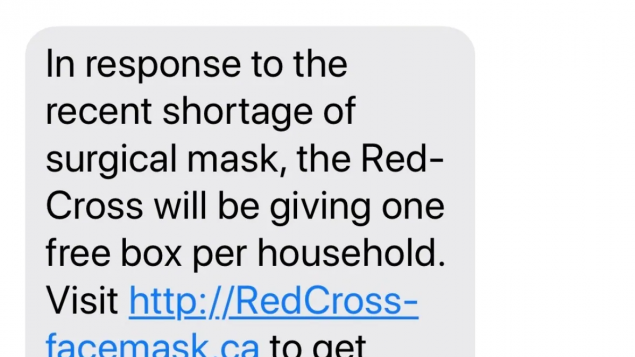It doesn’t take a crisis for fraudsters, fakers, and general creeps to try to take advantage of people, but it helps.
With the current pandemic and fears, lies, myths, scams, fraud has become rampant, and while some of the various schemes and scams are fairly low-tech, others involve skills such as very realistic mimicking government and other agency websites. Adding to the scams and “noise” are vast amounts of simple disinformation, mostly spread via social media.

An example of a text message phishing scam. This is not from the actual Red Cross and seeks to get money and/or other financial and personal information. Messages like this should be immediately deleted. (submitted by Michelle Cheung via CBC)
Canadian security agencies are currently working to take down malicious sites imitating actual Canadian government websites. Canada’s cyber security agency the Communications Security Establishment (CSE) has been working with other Canadian security operations to remove these sites which are “phishing” for people to unwittingly reveal personal identification information.
Fake emails are being sent purporting to be from the Public Health Agency of Canada, or the Red Cross, or the World Health Organisation and others, all trying to get people to click on the attached links and give up personal and/or financial information.
The World Health Organisation has also been consulting with big online retail operations like Amazon, Google, Apple an others to control sites selling fake corona cures. Here the purpose is the get money for products or services that are of no use or even potentially dangerous.
it should be carefully noted there is as of yet no cure or vaccine against the coronavirus, not garlic, not hot water, not cold water, not vitamin dosage, not silver or other “tinctures” or teas nor any of the increasing variety of claims.
Example of email phishing scam below

email phishing scam. Do not click on the links which will ask you to provide personal or financial information (via CBC)
Earlier this month, both the British Columbia college of naturopaths and college of chiropractors warned their members not to make claims about being able to cure, mitigate, or prevent the coronavirus through their practice.
The U.S Food and Drug Administration and Federal Trade Commission have also been sending warnings to various sites and businesses warning them to remove claims about being able to deal with the virus. A Canadian site, “Vivify Holistic Clinic” of Sarnia Ontario received a warning for claims on its website about teas that could be sold into the U.S.
Along with other medical agencies, the FDA reiterated that, ” “there currently are no vaccines, pills, potions, lotions, lozenges or other prescription or over-the-counter products available to treat or cure” the virus.
Some scams involve phone calls saying a person has tested positive for the virus and they need to provide credit card and/or health card numbers and other information. Real public health agencies do not ask for such information over the phone.
Another scam is the selling of fake coronavirus testing kits. Only hospitals and public health agencies have the ability, equipment, and authority to provide tests and they do not charge.
In Canada, verified information can be had from the official government coronavirus update website and from the Canadian Anti-Fraud Centre website.
additional information-sources:
- CBC: J. White: Mar 20/20: Beware scammers during COVID-19 outbreak, warns Canadian Anti-Fraud Centre
- CBC: N. Brockbank: Mar 19/20: Here’s what you need to know about the COVID-19 scams popping up in Canada
- CBC: Mar 6/20: Doctor warns of coronavirus ‘hucksters’ after televangelist Jim Bakker pitches fake cure
- Canadian Press (via Global): Mar 9/20: Coronavirus: U.S. warns Ontario company over false COVID-19 treatment claims
- Global News: S. Cooper: Mar. 13/20: Canada’s cyber agency dismantling fake government coronavirus pandemic response websites
- CBC: Feb /20: Busting garlic cures and other false coronavirus claims (video news report)
- BBC: Z. Thomas: Feb 13/20: WHO says fake coronavirus claims causing ‘infodemic’







For reasons beyond our control, and for an undetermined period of time, our comment section is now closed. However, our social networks remain open to your contributions.